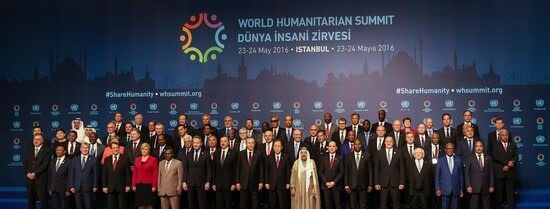LOCATION : Erasmus University College, Nieuwemarkt 1a Rotterdam - city centre not far from Metro Blaak
This conference, Six years after the Agenda for Humanity : humanitarianism challenged, jointly organised by the Erasmsus School of Social and Behavioural Sciences and the Norwegian Network on Humanitarian Studies, is taking stock of the progress of the Agenda for Humanity six years after its adoption. The event will bring together international scholars from various disciplinary fields, humanitarian practitioners and policy-makers on Friday November 24th at the Erasmus University Rotterdam. With a closing key note by Spinoza winner prof.dr. Thea Hilhorst.
- Date
- Friday 25 Nov 2022, 09:00 - 19:00
- Type
- Symposium
- Spoken Language
- English
- Room
- Erasmus Hall
- Location
- Erasmus University College
On May 23-24th 2016, close to 9000 representatives from humanitarian organizations, governments, academics and leaders of crisis-affected communities gathered in Istanbul to discuss how to better address the needs of people caught in humanitarian crises. Although the summit carefully avoided discussing contentious issues, it led to the adoption of the Agenda for Humanity, a five-point programme aiming to “outline the changes that are needed to alleviate suffering, reduce risk and lessen vulnerability on a global scale”.
Six years after this event, challenges to transnational solidarity and attacks on humanitarian values have never seemed so acute. The COVID-19 pandemic has served as a «vulnerability multiplier» and raised unprecedented challenges for humanitarian operations. The rise of nationalistic and far-right parties and their coming to power in Brazil, Italy, Hungary and Sweden daily challenge the capacity to maintain humanitarian commitments, particularly towards migrant populations. Humanitarian norms are under siege in Ukraine, Yemen and Burkina Faso. The goal of “leaving no one behind” has evacuated debates on the use of the concept of vulnerabilities as a political tool to build hierarchies among those deserving of aid or not. Lastly, the aid localisation agenda has seen crisis-affected governments exercise a stronger grip on humanitarian activities, aligning aid with their priorities and closing civil society's independent space.
Questions addressed:
- How do changes in international and domestic politics alter humanitarian commitments?
- How is the Agenda for Humanity’s narrative used to further political agenda?
- What are the implications of the Agenda’s core responsibilities on the power dynamics shaping the humanitarian field?
- Welcome and coffee
Programme
9.00 Doors open
9.30 Opening remarks (Carla Egger, EUR )
10.00 Panel 1: Afghanistan, Yemen, Ukraine : IHL in crisis?
Antonio Donini, Tuft University
Ghassan El Kahlout, DOHA Institute
Sara Gamha, Geneva Call
Alex Odlum, Geneva Centre for Humanitarian Studies
11.15 – Coffee break
11.30 – 13.00 - Panel 2 : Humanitarianism under siege: nationalism, illiberal humanitarianism and humanitarian commitments
Kristoffer Liden & Kristina Roepstorff, PRIO
Cristina Churruca, University of Deusto
Clara Egger, Erasmus University Rotterdam
Talita Cetinoglu, University of Groningen
13.00 – 14.30 Lunch break
14.30 – 15.45 Panel 3: From addressing to ending needs: the promises and perils of linking humanitarian action and development agendas
Haley Swedlund, Radboud University Nijmegen; Marie Eve Derosieres, University of Ottawa; Samiratou Dipama, Thomas Sankara University
Ronan Mc Dermott, University of Groningen
Cornelia C. Walther
Jon Harald Sande Lie, NUPI
15.45 – 16.00 – Coffee break
16.00 – 17.15 Panel 4: Moving forward with the localization agenda: addressing power imbalances in governance structures (organised in partnership with KUNO)
Representatives from the Alliance for Empowering Partnerships (A4EP), the Dutch Relief Alliance and the Dutch Ministry of Foreign Affairs
17.15 Closing keynote (Thea Hilhorst, International Institute of Social Studies)
18.00 Closing drinks
The conference will be followed by a special collection in the Journal of International Humanitarian Action.
- More information
Marjolein Kooistra, communications ESSB, kooistra@essb.eur.nl

